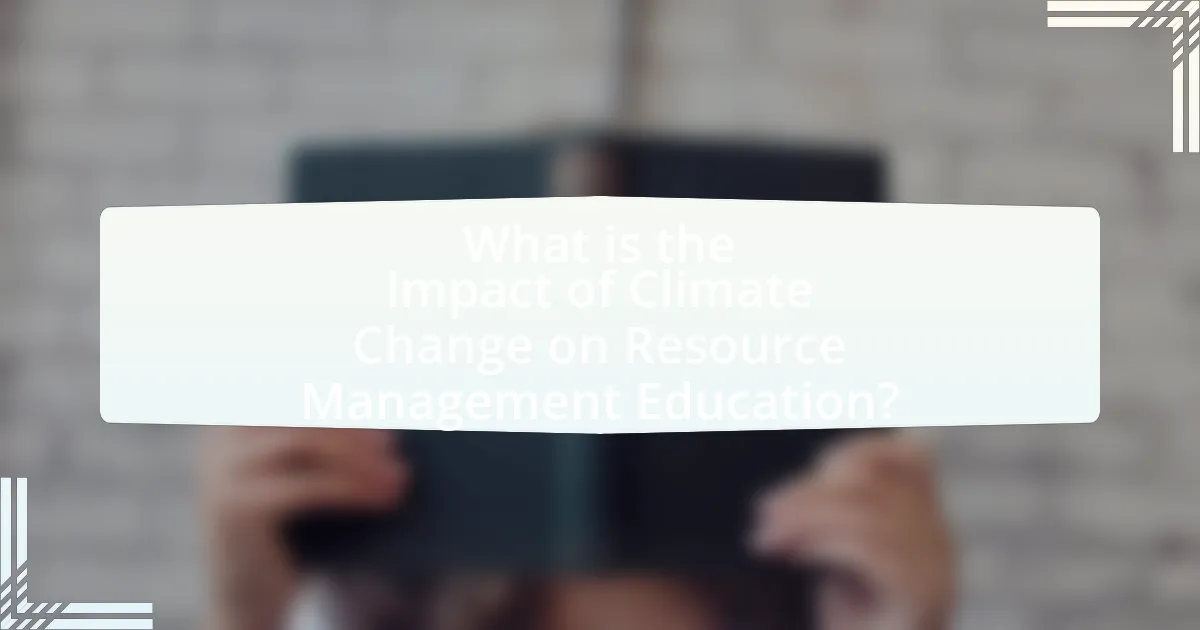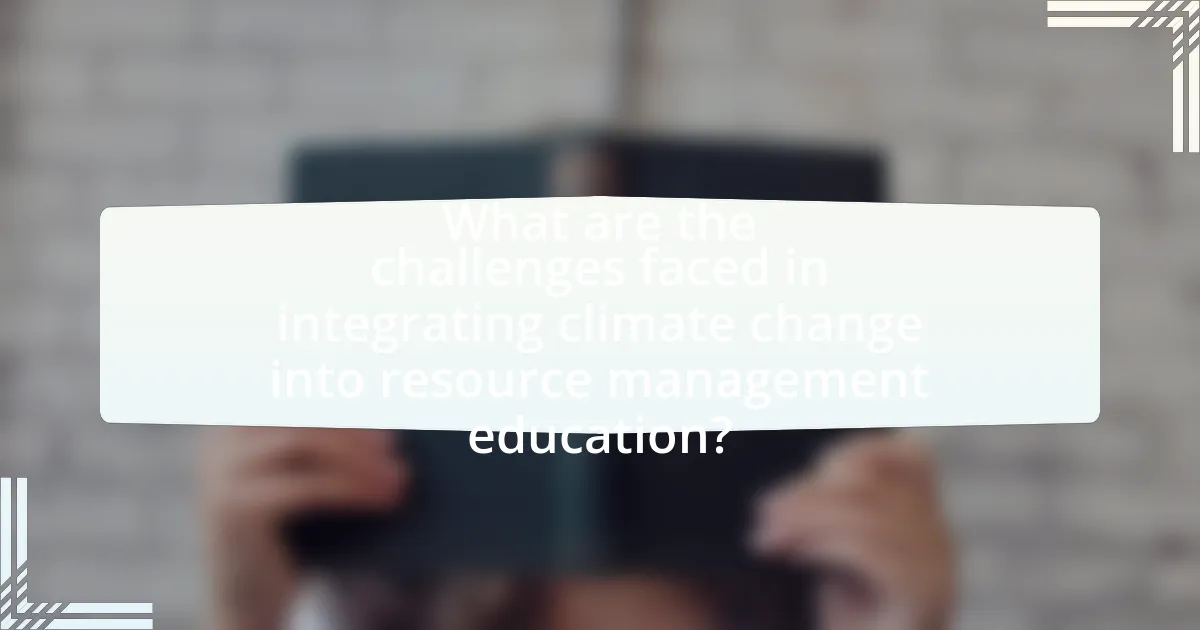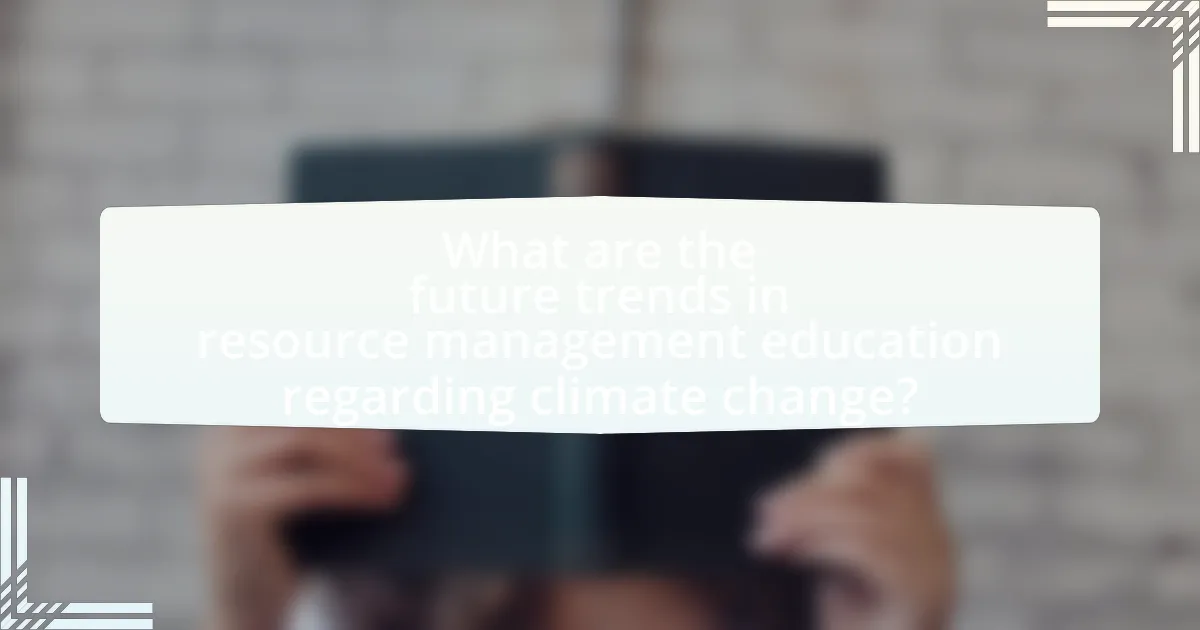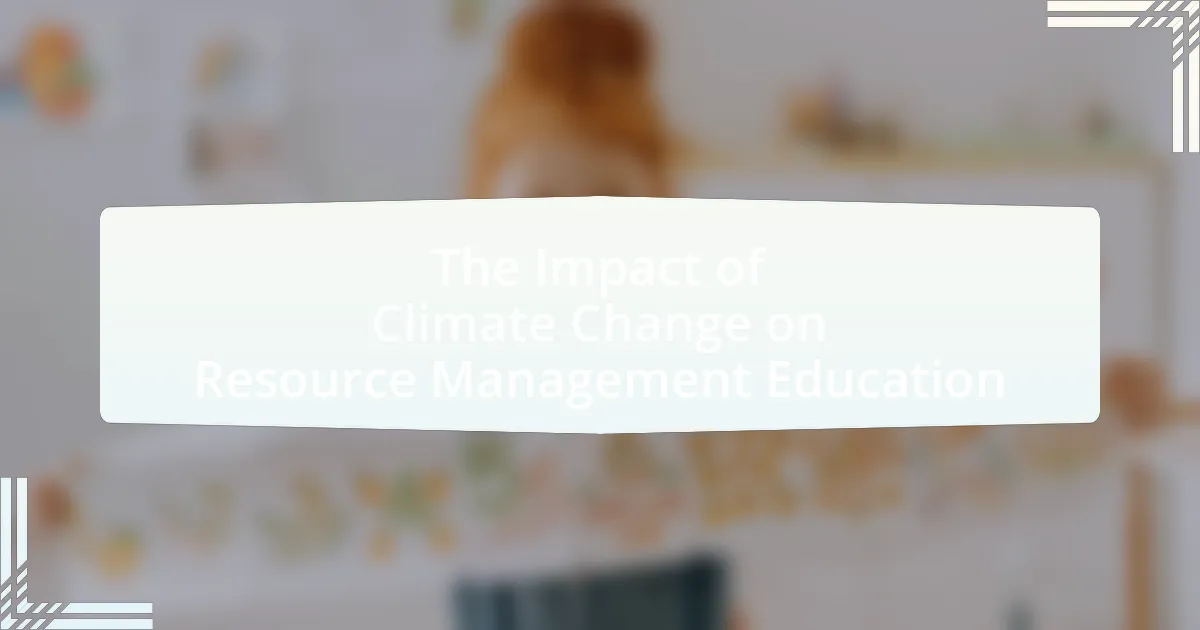The article examines the impact of climate change on resource management education, highlighting the necessity for educational programs to integrate sustainability principles and adaptive strategies into their curricula. It discusses how climate change influences curricula by incorporating key topics such as climate resilience, sustainable resource management, and environmental policy development. The article also addresses the evolving teaching methodologies that emphasize interdisciplinary approaches and experiential learning, while identifying challenges faced by educators in integrating climate change into resource management education. Furthermore, it outlines the skills future professionals will need to effectively manage resources in a changing climate and the importance of institutional support and collaboration with external organizations in enhancing educational outcomes.

What is the Impact of Climate Change on Resource Management Education?
Climate change significantly impacts resource management education by necessitating the integration of sustainability principles and adaptive strategies into curricula. Educational programs must now address the complexities of climate variability, resource scarcity, and ecosystem resilience, reflecting the urgent need for future professionals to be equipped with skills to manage these challenges. For instance, a study by the Intergovernmental Panel on Climate Change (IPCC) emphasizes that climate change will alter resource availability, requiring educational institutions to prepare students for innovative resource management practices that consider environmental, social, and economic dimensions. This shift in focus ensures that graduates are capable of developing effective responses to climate-related issues in resource management.
How does climate change influence resource management education curricula?
Climate change significantly influences resource management education curricula by necessitating the integration of sustainability principles and adaptive management strategies. Educational programs are increasingly incorporating topics such as climate resilience, ecosystem services, and the socio-economic impacts of climate change on resource availability. For instance, the United Nations’ Sustainable Development Goals emphasize the importance of education in promoting sustainable practices, which has led institutions to revise their curricula to include climate-related case studies and interdisciplinary approaches. This shift ensures that future resource managers are equipped with the knowledge and skills to address the challenges posed by climate change effectively.
What key topics are integrated into resource management education due to climate change?
Key topics integrated into resource management education due to climate change include sustainable resource management, climate adaptation strategies, and environmental policy development. Sustainable resource management focuses on practices that ensure resources are used efficiently and responsibly, addressing the challenges posed by climate change. Climate adaptation strategies teach students how to modify practices to cope with changing environmental conditions, such as altered precipitation patterns and increased frequency of extreme weather events. Environmental policy development emphasizes the creation of regulations and frameworks that promote resilience and sustainability in resource management, reflecting the urgent need for effective governance in the face of climate impacts. These topics are essential for preparing future professionals to address the complexities of resource management in a changing climate.
How are teaching methodologies evolving in response to climate change?
Teaching methodologies are evolving to incorporate climate change by integrating interdisciplinary approaches, experiential learning, and technology-enhanced education. Educators are increasingly emphasizing real-world applications and problem-solving related to climate issues, which fosters critical thinking and adaptability among students. For instance, programs now often include project-based learning where students engage in local environmental projects, allowing them to apply theoretical knowledge to practical challenges. Additionally, the use of digital tools and online platforms has expanded access to diverse resources and global perspectives on climate change, enhancing collaborative learning experiences. Research indicates that these methodologies not only improve student engagement but also better prepare them for careers in sustainability and resource management, as evidenced by studies showing increased retention of knowledge and skills when students participate in hands-on, relevant learning experiences.
Why is it essential to address climate change in resource management education?
Addressing climate change in resource management education is essential because it equips future professionals with the knowledge and skills necessary to manage resources sustainably in a changing environment. Climate change significantly impacts resource availability, ecosystem health, and human livelihoods, necessitating an understanding of its effects on water, land, and biodiversity. For instance, the Intergovernmental Panel on Climate Change (IPCC) reports that climate change will exacerbate water scarcity and affect agricultural productivity, highlighting the need for educated resource managers to develop adaptive strategies. By integrating climate change into the curriculum, educational programs can prepare students to implement effective resource management practices that mitigate climate risks and promote resilience in communities.
What are the potential consequences of neglecting climate change in this field?
Neglecting climate change in resource management education can lead to significant consequences, including inadequate preparation of future professionals to address environmental challenges. This lack of preparedness can result in ineffective resource management practices, exacerbating issues such as water scarcity, biodiversity loss, and ecosystem degradation. For instance, a study by the Intergovernmental Panel on Climate Change (IPCC) highlights that failure to integrate climate considerations into resource management can lead to a 20-30% decline in agricultural yields by 2050, directly impacting food security and economic stability. Additionally, neglecting climate change can hinder the development of adaptive strategies necessary for resilience, ultimately increasing vulnerability to climate-related disasters.
How does climate change awareness enhance student engagement in resource management?
Climate change awareness enhances student engagement in resource management by fostering a sense of responsibility and urgency regarding environmental issues. When students understand the implications of climate change, they are more likely to participate actively in resource management initiatives, as evidenced by studies showing that educational programs focused on climate change lead to increased student involvement in sustainability projects. For instance, research conducted by the National Wildlife Federation indicates that students exposed to climate change education demonstrate a 30% increase in participation in environmental stewardship activities. This heightened engagement is driven by a desire to contribute positively to their communities and mitigate the effects of climate change on natural resources.

What are the challenges faced in integrating climate change into resource management education?
Integrating climate change into resource management education faces several challenges, primarily due to the complexity of climate science and the need for interdisciplinary approaches. Educators often struggle with the rapidly evolving nature of climate data, which can make curriculum development difficult. Additionally, there is a lack of standardized educational frameworks that incorporate climate change effectively, leading to inconsistencies in teaching methods and content across institutions. Furthermore, resistance from stakeholders who may prioritize traditional resource management practices over climate-focused strategies complicates the integration process. These challenges are compounded by limited resources and training for educators to adequately address climate change topics within existing curricula.
What barriers do educators encounter when teaching about climate change?
Educators encounter several barriers when teaching about climate change, including a lack of resources, insufficient training, and resistance from stakeholders. The lack of resources often manifests as inadequate access to up-to-date materials and technology, which hinders effective teaching. Insufficient training means that many educators do not feel confident in their knowledge of climate science, limiting their ability to convey complex concepts. Additionally, resistance from stakeholders, such as parents or school administrations, can create an environment where climate change education is undervalued or opposed, further complicating the teaching process. These barriers collectively impede the integration of climate change education into resource management curricula.
How does a lack of resources impact the effectiveness of climate change education?
A lack of resources significantly diminishes the effectiveness of climate change education by limiting access to essential materials, trained educators, and practical experiences. Without adequate funding, educational institutions struggle to provide up-to-date curricula, technology, and hands-on learning opportunities, which are crucial for engaging students and fostering a comprehensive understanding of climate issues. Research indicates that schools with insufficient resources often resort to outdated teaching methods, resulting in lower student engagement and retention of information. For instance, a study by the National Center for Education Statistics found that schools in low-income areas are less likely to offer advanced science courses, which are vital for understanding climate science. This disparity in resource allocation ultimately hinders the ability to equip future generations with the knowledge and skills necessary to address climate change effectively.
What role does institutional support play in overcoming these challenges?
Institutional support plays a crucial role in overcoming challenges related to climate change in resource management education by providing necessary resources, funding, and infrastructure. This support enables educational institutions to develop and implement innovative curricula that address climate change impacts, ensuring that students are equipped with relevant knowledge and skills. For instance, universities that receive institutional backing can invest in research initiatives focused on sustainable practices, which can lead to the development of effective resource management strategies. Additionally, institutional support fosters collaboration between academia and industry, facilitating the exchange of knowledge and best practices essential for adapting to climate change.
How can educators effectively address these challenges?
Educators can effectively address the challenges posed by climate change in resource management education by integrating interdisciplinary approaches that combine scientific knowledge with practical applications. This method allows educators to provide students with a comprehensive understanding of climate impacts on resources, fostering critical thinking and problem-solving skills. For instance, incorporating case studies that illustrate real-world scenarios of resource management affected by climate change can enhance students’ engagement and understanding. Research indicates that experiential learning, such as fieldwork and simulations, significantly improves students’ ability to apply theoretical concepts to practical situations, thereby preparing them for future challenges in resource management.
What strategies can be implemented to improve climate change education?
To improve climate change education, integrating interdisciplinary curricula that combine science, policy, and ethics is essential. This approach fosters a comprehensive understanding of climate issues by connecting scientific principles with real-world applications and ethical considerations. Research indicates that programs incorporating hands-on learning experiences, such as field studies and community projects, significantly enhance student engagement and retention of climate-related knowledge. For instance, a study published in the Journal of Environmental Education found that experiential learning increased students’ understanding of climate change impacts by 40%. Additionally, utilizing digital platforms for interactive learning can broaden access and facilitate collaboration among diverse educational institutions, further enriching the educational experience.
How can collaboration with external organizations enhance educational outcomes?
Collaboration with external organizations can enhance educational outcomes by providing access to specialized knowledge, resources, and real-world experiences that enrich the learning environment. For instance, partnerships with environmental NGOs can offer students hands-on projects related to climate change, fostering practical skills and critical thinking. Research by the National Education Association indicates that such collaborations can lead to improved student engagement and higher academic achievement, as they connect theoretical concepts to real-world applications. Additionally, external organizations often bring diverse perspectives and expertise, which can broaden the curriculum and better prepare students for future challenges in resource management related to climate change.

What are the future trends in resource management education regarding climate change?
Future trends in resource management education regarding climate change include an increased emphasis on interdisciplinary approaches, integration of technology, and a focus on sustainability practices. Educational institutions are recognizing the need to equip students with skills that combine environmental science, economics, and social sciences to address complex climate challenges. For instance, programs are increasingly incorporating data analytics and geographic information systems (GIS) to enhance decision-making in resource management. Additionally, there is a growing trend towards experiential learning, where students engage in real-world projects that address climate impacts on resources. This shift is supported by research indicating that hands-on experience significantly improves understanding and retention of climate-related concepts.
How is technology shaping the future of climate change education in resource management?
Technology is significantly shaping the future of climate change education in resource management by enhancing accessibility, interactivity, and data-driven decision-making. Digital platforms and online courses allow a broader audience to engage with climate change topics, making education more inclusive. For instance, the use of Geographic Information Systems (GIS) enables students and professionals to visualize and analyze environmental data, fostering a deeper understanding of resource management challenges. Additionally, simulations and virtual reality tools provide immersive learning experiences that illustrate the impacts of climate change on ecosystems and resources. Research indicates that integrating technology in education can improve knowledge retention and application, as seen in studies conducted by the National Oceanic and Atmospheric Administration, which demonstrate increased engagement and understanding among learners using interactive tools.
What innovative tools are being used to teach climate change concepts?
Innovative tools used to teach climate change concepts include interactive simulations, virtual reality experiences, and gamified learning platforms. These tools engage learners by providing immersive experiences that illustrate the effects of climate change in real-time scenarios. For instance, platforms like Climate Interactive use simulation models to demonstrate the impact of various climate policies, allowing users to visualize outcomes based on different decisions. Additionally, virtual reality applications, such as those developed by the VR for Climate Change initiative, enable students to explore environments affected by climate change, enhancing their understanding through experiential learning. Gamified platforms, like the game “Eco,” encourage players to manage resources sustainably while facing climate-related challenges, reinforcing the importance of responsible resource management in the context of climate change.
How can online learning platforms expand access to climate change education?
Online learning platforms can expand access to climate change education by providing flexible, scalable, and diverse educational resources to a global audience. These platforms enable learners from various backgrounds and locations to access high-quality content, such as courses, webinars, and interactive materials, often at little to no cost. For instance, platforms like Coursera and edX offer courses from top universities that cover climate science, policy, and sustainable practices, reaching millions of users worldwide. This democratization of knowledge is crucial, as it allows individuals in underserved regions to gain insights and skills necessary for addressing climate challenges, thereby fostering a more informed and proactive global community.
What skills will future resource management professionals need to address climate change?
Future resource management professionals will need skills in data analysis, sustainability practices, and stakeholder engagement to effectively address climate change. Data analysis skills enable professionals to interpret climate data and assess resource impacts, which is critical for informed decision-making. Sustainability practices, including knowledge of renewable energy and conservation techniques, are essential for developing strategies that minimize environmental impact. Additionally, stakeholder engagement skills are necessary for collaborating with communities, governments, and organizations to implement effective resource management policies. These skills are supported by the increasing demand for climate-resilient practices in various sectors, as highlighted in reports from the Intergovernmental Panel on Climate Change, which emphasize the need for integrated approaches to resource management in the face of climate challenges.
How can educational programs adapt to equip students with these skills?
Educational programs can adapt to equip students with skills relevant to climate change by integrating interdisciplinary curricula that combine environmental science, economics, and policy analysis. This approach ensures that students understand the complexities of resource management in the context of climate change. For instance, programs can incorporate case studies that illustrate real-world challenges and solutions, such as the impact of climate change on water resources or agricultural practices. Research indicates that experiential learning, such as fieldwork and simulations, enhances students’ problem-solving abilities and prepares them for practical applications in resource management. By fostering collaboration with local communities and stakeholders, educational programs can also provide students with hands-on experience in addressing climate-related issues, thereby enhancing their skill sets and employability in a changing job market.
What role does interdisciplinary learning play in preparing students for climate challenges?
Interdisciplinary learning plays a crucial role in preparing students for climate challenges by integrating knowledge from various fields such as environmental science, economics, and social studies. This approach equips students with a holistic understanding of complex climate issues, enabling them to analyze and address multifaceted problems effectively. For instance, research from the National Academy of Sciences highlights that interdisciplinary education fosters critical thinking and problem-solving skills, essential for developing innovative solutions to climate-related challenges. By engaging with diverse perspectives, students can better understand the interconnectedness of ecological, economic, and social factors, ultimately leading to more sustainable resource management practices.
What best practices can educators adopt for effective climate change education?
Educators can adopt interdisciplinary approaches as a best practice for effective climate change education. This method integrates knowledge from various fields such as science, economics, and social studies, allowing students to understand the multifaceted nature of climate change. Research indicates that interdisciplinary education enhances critical thinking and problem-solving skills, which are essential for addressing climate-related challenges. For instance, a study published in the Journal of Environmental Education found that students engaged in interdisciplinary projects demonstrated a 30% increase in their understanding of climate change impacts compared to traditional teaching methods. By fostering collaboration among different subjects, educators can create a more comprehensive learning experience that prepares students to tackle climate issues effectively.

Leave a Reply